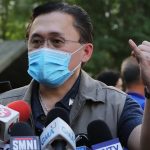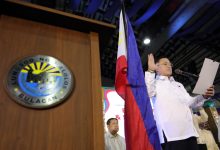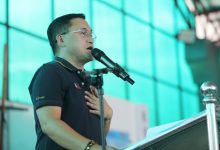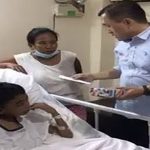SENATOR Christopher “Bong” Go expressed his strong support for 125 students of the Technical Education and Skills Development Authority (TESDA) program during the release of their allowance and training certificates in Argao and Sibonga, Cebu. The educational venture was initiated in collaboration with the Call Center Academy in Argao and Sibonga.
As part of his support, Go provided them with grocery packs, burgers and shirts on Thursday, November 16.
In a video message, Go underscored the importance of Technical and Vocational Education and Training (TVET) in the country. He said TVET aims to bridge the skills gap and ensure that all Filipinos, regardless of their economic background, have the opportunity to gain relevant and in-demand skills that will allow them to secure gainful employment and contribute to the country’s overall economic growth.
“The skills and knowledge you have acquired here will be your foundation for success in your chosen field,” said Go.
“Your dedication, hard work, and determination have truly paid off, and you stand as shining examples of the power of education and skill development. Through your commitment, you have not only enhanced your own capabilities but also contributed to the growth and progress of our nation,” he added.
Go also filed Senate Bill No. (SBN) 2115, which aims to institutionalize TVET as well as livelihood programs for rehabilitated drug dependents. The bill aims to provide skills training to enhance the employability of former drug dependents and allow them to rebuild their lives and contribute to their communities.
“Rehabilitation alone is not enough. By institutionalizing technical-vocational education and training programs, we empower rehabilitated drug dependents with skills for a better future,” he said.
Meanwhile, in a continued effort to enhance the well-being of Filipino workers facing crises residing in rural areas with limited employment prospects, Go introduced Senate Bill No. (SBN) 420. This proposed legislation aims to provide temporary employment to eligible members of low-income rural households by establishing the Rural Employment Assistance Program (REAP) under DOLE.
If legislated, the primary goal of REAP would be to furnish temporary job opportunities to individuals meeting specific criteria related to economic disadvantage, poverty, displacement, or seasonal employment.
Go, chairperson of the Senate Committee on Health and Demography, said that the government’s medical assistance programs are conveniently accessible in seven Malasakit Centers in the province.
Signed into law in 2019, the Malasakit Centers Act, which was principally authored and sponsored by Go, institutionalized the Malasakit Centers program to ensure that indigent patients have convenient access to medical assistance programs.
Malasakit Centers bring together representatives from the Department of Social Welfare and Development (DSWD), Department of Health (DOH), Philippine Health Insurance Corporation (PhilHealth), and Philippine Charity Sweepstakes Office (PCSO). These one-stop shops aim to support impoverished patients in reducing their hospital costs to the least possible amount.
In Cebu City, Malasakit Centers are located at Vicente Sotto Memorial Medical Center (VSMMC), St. Anthony Mother and Child Hospital, and Cebu City Medical Center (CCMC). Meanwhile, there are other Malasakit Centers at Cebu Provincial Hospital in Carcar City, Lapu-Lapu City District Hospital, Eversley Childs Sanitarium and General Hospital in Mandaue City, and Talisay District Hospital in Talisay City.
There are now 159 Malasakit Centers nationwide which have assisted over ten million Filipinos as of October 2023, according to DOH.
Go also mentioned that more Super Health Centers are set to be established in the province. With the support of DOH, local government units, and fellow lawmakers, Go helped secure sufficient funds in the 2022 and 2023 national budgets for the construction of more than 600 Super Health Centers across the country.
Designed to focus on primary care, consultation, and early detection, Super Health Centers aim to strengthen the healthcare infrastructure, particularly in rural communities.
Go also brought attention to Republic Act 11959 or the Regional Specialty Centers Act, for which he served as a principal sponsor and one of the authors in the Senate. The Regional Specialty Centers Act assumes an important role in the healthcare legislative priorities of the Marcos Administration, as outlined in the Philippine Development Plan for the years 2023 to 2028. This law shall create Regional Specialty Centers within pre-existing regional hospitals under the jurisdiction of DOH.
Currently, there are three Regional Specialty Centers inside VSMMC, including cardiovascular care, neonatal care, and trauma care. There will be other specialty centers set to be established inside the hospital, such as renal care and transplant center, lung care, brain and spine care, orthopedic center, physical rehabilitation medicine, infectious disease and tropical medicine, mental health, burn care, toxicology, cancer care, geriatric care, eye care, and dermatology care.
Go, vice chairperson of the Senate Committee on Finance, likewise supported the funding of various projects in the province, including the construction of multipurpose buildings in Barili, Cordova, Ginatilan, Pilar, Tabogon and Talisay City; improvement of existing roads in Alcantara, Alcoy, Alegria, Asturias, Balamban, Boljoon, Borbon, Carmen, Madrilejos, Malabuyoc, Minglanilla, Moalboal, Pinamungajan, Sibonga, Sogod, Tabogon, Tabuelan, Carcar City and Naga City; improvement of flood mitigation structures in Catmon and Tuburan; installation of street lights in Asturias, Compostela and Daanbantayan; and acquisition of ambulance units for Madridejos and Naga City.








